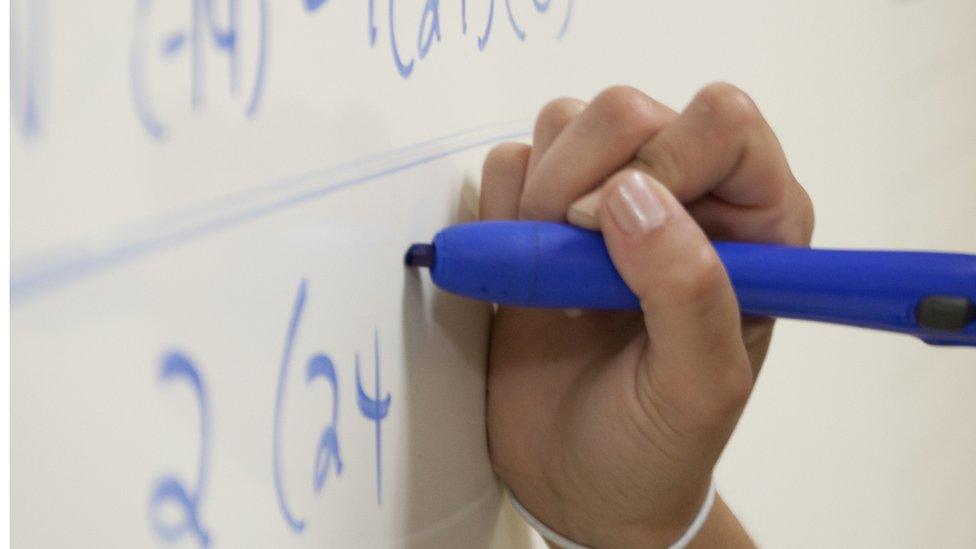Post-16 maths to get government cash boost
- Published

Too few students continue with maths after 16, the review says
Maths education for 16- to 19-year-olds in England will gain a £16m boost over two years, ministers have announced.
It comes as a government commissioned maths review found too many teenagers dropped maths after GCSE, harming their job prospects and the wider economy.
The cash, from existing budgets, will help more students take a maths A-level or core maths qualification, external, say ministers.
Better maths skills were "vital", said Education Minister Nick Gibb.
In most advanced countries, all young people continue to study maths beyond the age of 16 - but England "remains unusual" because this is not the case, says the review, by Prof Sir Adrian Smith, vice-chancellor of the University of London.
And among teenagers with good GCSE grades, almost three-quarters "choose not to study mathematics beyond this level".
"England was the only country in a 2013 sample of developed economies where young adults performed no better than older adults in numeracy proficiency," the review says.
And lack of maths proficiency can leave university students anxious and unconfident about any maths or statistics required in their courses and limit young people's career prospects at every level.

The core maths qualification aims to plug a gap for sixth-formers not taking maths A-levels
If more sixth-formers took maths, it "could deliver significant payback for individuals, for the economy and in increased productivity", said Prof Smith.
The review says "as an urgent and immediate measure", the government should put money into AS- and A-levels in maths and into the government's core maths qualification, introduced in 2015 with the aim of increasing the number of sixth-formers studying the subject.
"Core maths plugs a critical gap" for students going on to higher education or higher technical study with a mathematical element, the report says.
But the subject has suffered from too little funding and a lack of awareness, with the result that uptake has been too low.
The government says the cash, to be paid in two £8m chunks from April next year, will be used to:
inspire more post-16s to study maths
improve post-16 maths teaching through better professional development, support and resources
ensure more schools and colleges offer core maths
develop an online platform for core maths
encourage more students, particularly girls, to take maths A-levels
"The government is determined to give all young people the world-class education they need to fulfil their potential," said Mr Gibb in a written ministerial statement setting out the plan.
"This includes providing opportunities to develop the mathematical and quantitative knowledge and skills appropriate to their chosen careers.
"In an increasingly technological world, this will be vital to ensuring that our future workforce will be productive and competitive in the global marketplace."
Frank Kelly, chairman of the Royal Society Advisory Committee on Mathematics Education, said better funding for post-16 maths was key.
"Mathematics skills are necessary to a wide variety of disciplines, and we welcome the government's recognition of their importance and commitment to improving opportunities in schools and colleges."
Chris Linton, president of the Institute of Mathematics, said: "The UK lags well behind the rest of the developed world in the number of students studying mathematics post-16, and Sir Adrian's report provides clear evidence that this needs to be reversed."
Mike Ellicock, chief executive of National Numeracy, said the current system "abjectly fails to equip far too many young people adequately for their future lives and the world of work".